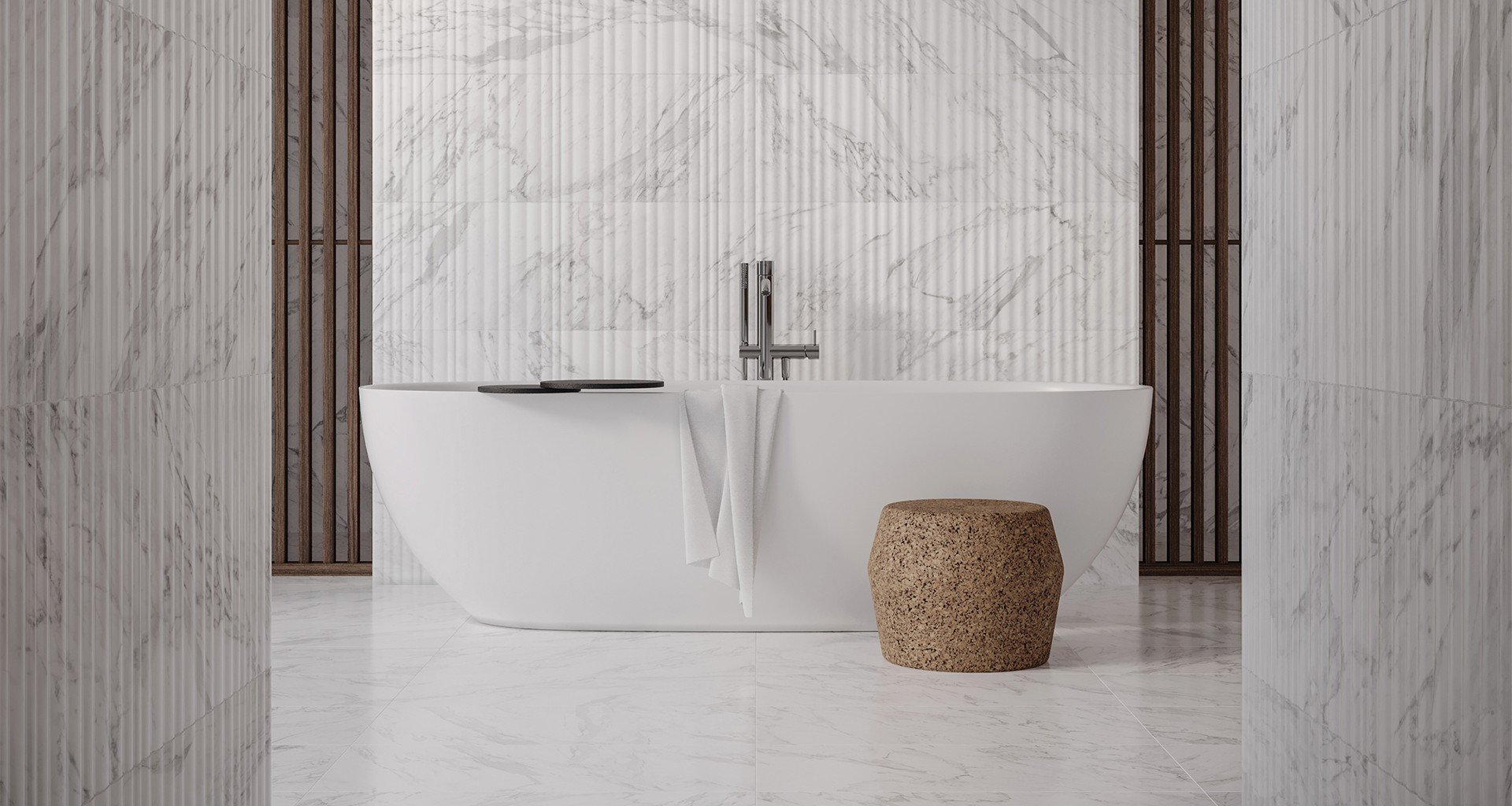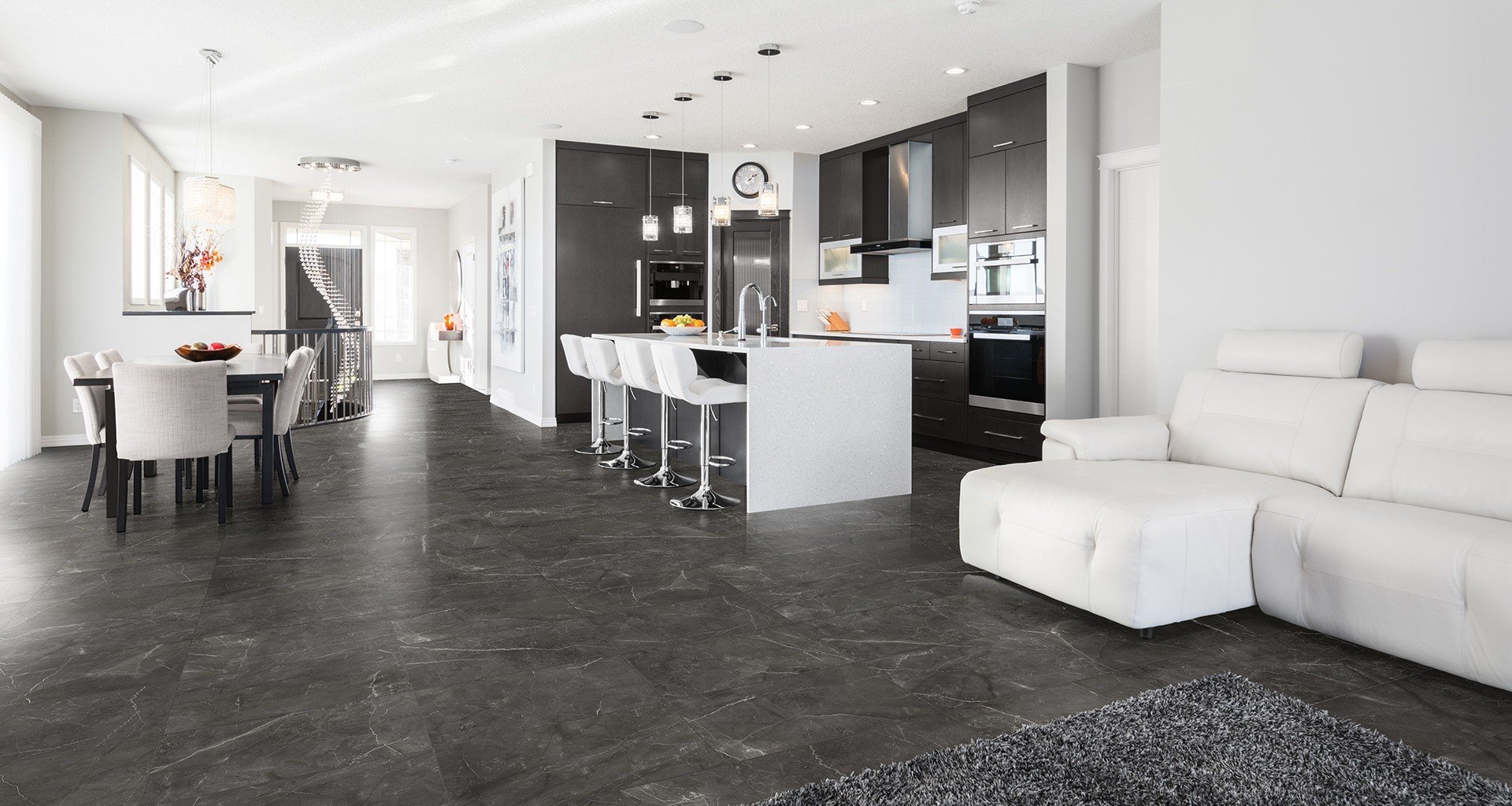FLOORING
TILE
Made with precision and expert care, tile flooring is built to last. Its ability to handle heavy foot traffic and resist stains make it one of the most versatile flooring options. Whether in a busy home or commercial space, tile flooring offers the perfect balance of toughness and style—this is why so many people love it.
What is Tile Flooring Made From?
Creating tile flooring involves carefully selecting and processing raw materials, then shaping and firing them at high temperatures to ensure they’re tough enough to handle heavy use. This process makes tiles highly resistant to stains, scratches, and moisture.
Tile flooring can be made from ceramic, porcelain, or natural stone, each offering its unique look and benefits. These materials are then crafted into individual tiles, laid together with grout, filling the gaps in between.
The versatility of tiles extends beyond just flooring. They can be used on walls, backsplashes, and even in decorative accents. This flexibility allows them to enhance various parts of a space, from kitchens and bathrooms to living areas and commercial environments, providing a cohesive and stylish look.
Types of Floor Tiles
Some of the common types of tiles include:
Ceramic Tiles
Made from clay moulded and fired at high temperatures, ceramic tiles are a top choice for flooring. Their popularity stems from their affordability and the wide variety of styles available. They come in an extensive range of colours, sizes, and designs, allowing you to create a custom look that fits your style and preferences.
Ceramic tiles are durable, resisting scratches, stains, and moisture, which makes them ideal for high-traffic areas. Plus, they are easy to clean and maintain, ensuring they look great for years.
Porcelain Tiles
Porcelain tiles are made from fine clay that’s fired at high temperatures, resulting in a highly durable and dense flooring option. They are often considered superior to ceramic tiles due to their increased density and resistance to moisture and stains, making them ideal for high-traffic areas.
Advanced manufacturing techniques allow porcelain tiles to mimic surfaces such as brick, natural stone, and wood, offering endless design possibilities. Their durability and design versatility make them a practical choice for both residential and commercial spaces.
Natural Stone Tiles
Natural stone tiles, like marble, granite, limestone, and slate, are directly sourced from quarries and then refined into tiles. Each stone type features its own distinctive colours and patterns, offering a unique and luxurious look.
While they need more maintenance than ceramic or porcelain tiles, natural stone tiles can endure for decades with proper care and sealing. They are ideal for creating a standout look and enhancing a home’s value with timeless elegance.
Glass Tiles
Made from molten glass that’s cooled and shaped, glass tiles are known for their sleek, glossy finish and ability to reflect light. They’re a great way to introduce a splash of colour and texture, enhancing any space with a vibrant, contemporary look.
Although they’re less durable than ceramic or porcelain tiles and can chip more easily, glass tiles make bold design statements. With a variety of colors and finishes available, they offer numerous design possibilities. While they resist stains and moisture, maintaining their shine requires careful installation and regular cleaning.
Pros of Floor Tiles
Durability: Floor tiles are long-lasting and can withstand heavy foot traffic, scratches, and stains, making them a durable choice for high-traffic areas.
Versatility: Tiles come in various colours, patterns, sizes, and materials, allowing for different design options from modern to traditional styles.
Ease of Maintenance: Tiles are relatively easy to clean and maintain, requiring only regular sweeping and mopping. They are also resistant to water and stains.
Temperature Regulation: Due to their excellent thermal conductivity, tiles help regulate room temperature and keep spaces cool in hot weather, making them ideal for warmer climates.
Hygienic: Tiles do not harbour allergens like carpets and are easy to clean, making them an excellent choice for kitchens and bathrooms.
Cons of Floor Tiles
Hardness: Tile flooring can be uncomfortable to stand or walk on for extended periods due to its hard surface.
Coldness: Tiles may feel cold to the touch, especially in cooler climates or during winter, making them less comfortable underfoot.
Susceptibility to Damage: While durable, tiles are not indestructible. Heavy objects can cause cracks or chips, and sharp items may scratch the surface.
Installation Complexity: Installing tiles can be complex and time-consuming, with risks of uneven surfaces or cracks if not done correctly.
Grout Maintenance: Grout can collect dirt and mould, requiring regular cleaning to prevent discolouration and deterioration.
Maintenance of Floor Tiles
Regular Cleaning: Regularly sweep or vacuum tile floors to remove dirt and debris. Mop with a mild, non-abrasive cleaner to maintain their shine.
Grout Care: Clean grout lines with a brush to prevent dirt and stains. Consider sealing grout annually to protect against moisture and staining.
Avoid Harsh Chemicals: Use gentle cleaners to avoid damaging the tile surface and grout. Avoid bleach and ammonia, which can cause discoloration and damage.
Prompt Spill Cleanup: Wipe up spills immediately to prevent stains and water damage. Tiles are water-resistant, but prolonged exposure can affect grout and tiles.
Regular Maintenance: Inspect floor tiles for signs of damage, such as cracks or chips, and perform maintenance or repairs as necessary.
Are you considering tile flooring for your next project? Let our team guide you with personalized advice and expert installation. Reach out today to discover how we can elevate your space with lasting quality and visual appeal.







